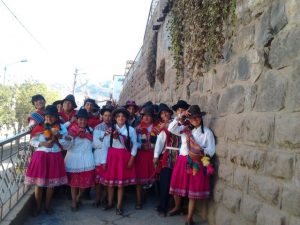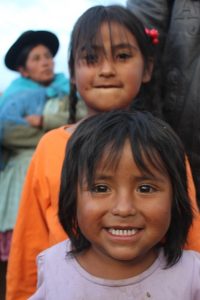Quihares, Huaninpampa, and Colcha each have a CRFA (Centro Rural de Formación en Alternancia) school. These schools overcome the large distances students must travel from their respective communities to study at the secondary level by working in shifts. For 15 days, two or three grades will live at the school and attend daily classes while the other two or three grades are in their home communities working on individual micro-enterprise projects.
The benefit of the alternating system as opposed to traditional secondary schools or boarding schools is that students are provided with the opportunity to study at the secondary level without having to decide between traveling long distances daily or leaving their families and communities for extended periods of time.
The alternating system allows them to study inside the classroom for 15 days and then return to their families for 15 days of project work in their communities.
This project aims to improve the CFRA curriculum by implementing three new strategies designed by the University of Barcelona as part of the European Union’s INCLUD-ED Project, which aims to improve the students’ reading comprehension and increase parent/community involvement in the education of their children. To do so, the Alma Foundation has hired an additional teacher in each school and provides part of the required reading materials.
 Strategy1: Literary Gatherings and Dialogue
Strategy1: Literary Gatherings and Dialogue
Students gather to discuss previously assigned readings and present which passage they related to most and why. The teachers passively guide the discussions and debates lead by the students to help identify central themes of the readings and how they relate to their everyday lives.
Strategy 2: Family Workshops
Teachers visit each students’ family individually and hold group workshops in order to train the students’ parents on how to actively participate and assist in the education of their children. Eventually, parents are invited into the classroom to lead lessons and assist the students in their assignments. All parents are invited to receive training in order to enhance skills they already possess and learn new teaching techniques. Therefore, even an illiterate parent can join in classroom discussions and help the students in c ertain assignments.
ertain assignments.
Strategy 3: Teacher Trainings
In order to prepare the existing and the newly hired teachers for the implementation of the above two strategies, teachers receive 20 trainings per school year from the staff of ProRural, a Peruvian organization that specializes in the implementation of CFRA schools. All costs of trainings will be covered by ProRural.
In total, this project impacts 227 students, 180 parents, and 19 teachers.

